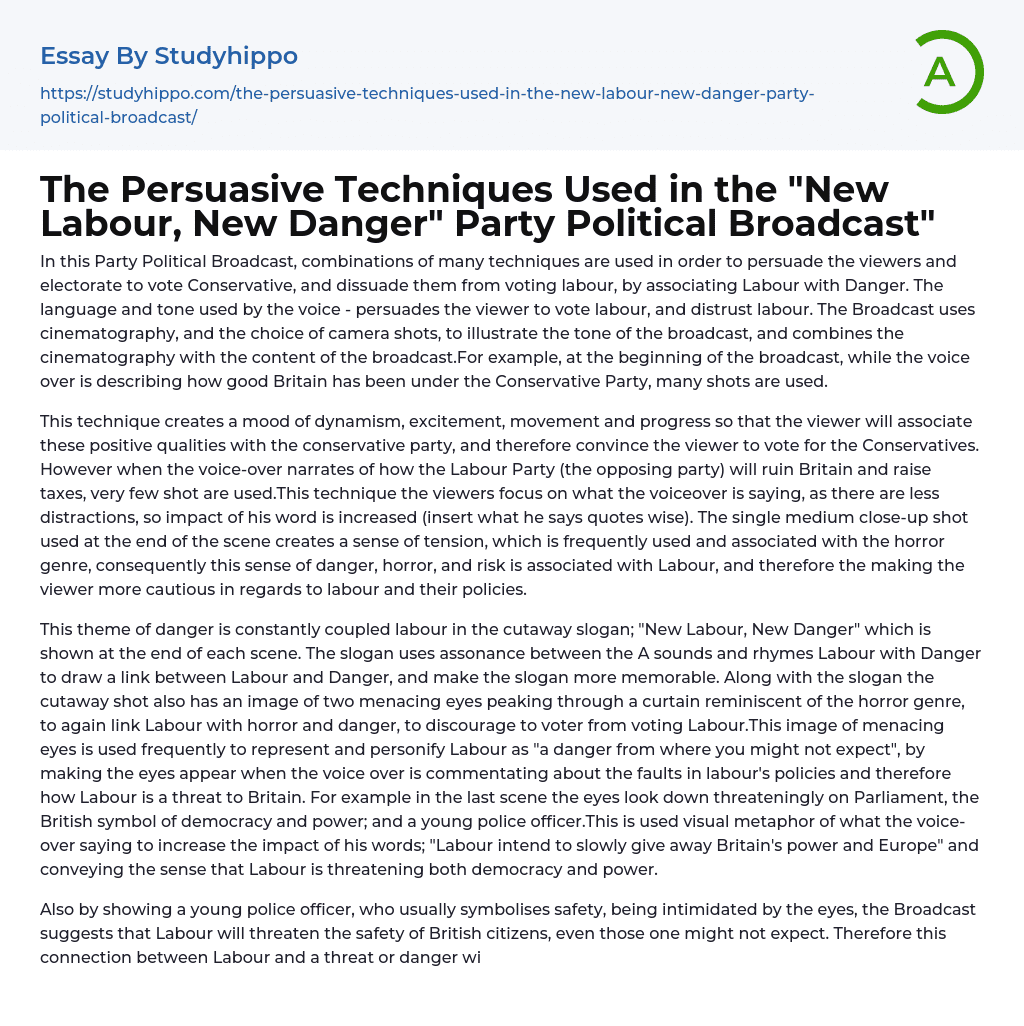

Persuading the Viewers: Conservative Party Political Broadcast
The Party Political Broadcast employs various techniques to sway the electorate towards voting conservative and away from labour, painting them as a dangerous choice. The tone of the voiceover is deliberately chosen to gain viewers' trust while sowing distrust for Labour. This is reinforced by the use of specific camera shots, synchronized with the content, in order to create the desired emotional impact. In the opening of the broadcast, shots are used to showcase how well Britain has done under the Conservative Party along with the voiceover.
By using this technique, the Conservative party aims to create a lively, enthusiastic, moving and advancing aura that will lead the viewer to link these positive traits with their party and, therefore, persuade them to vote for them. However, when the narrator mentions how the opposing Labour party w
...ill harm Britain and increase taxes, few shots are shown. This technique permits the viewers to concentrate on what the voiceover is saying because there are fewer distractions, thus enhancing the impact of his words. The final scene's single medium-close up shot generates a feeling of tension that is typically associated with horror films. As a consequence, this sense of danger, horror and risk gets connected with the Labour party and makes viewers less willing to support them or their policies.
The theme of danger is consistently associated with Labour in the cutaway slogan, "New Labour, New Danger." This slogan uses assonance and rhyming to link the two words in a memorable way. In addition to the slogan, the cutaway shot features an image of menacing eyes peering through a curtain, reminiscent of a horror movie. This image further connect
Labour with danger and discourages voters from supporting them. The same image of menacing eyes is used throughout the video to personify Labour as a threat, especially when criticizing their policies. In the last scene, the eyes look down menacingly on Parliament and a young police officer, visually representing the voice-over's statement that "Labour intend to slowly give away Britain's power and Europe," implying that they threaten both democracy and power.
The Broadcast aims to dissuade viewers from voting for Labour by depicting a young police officer, traditionally a symbol of safety, being intimidated by a threatening gaze. This creates a connection between Labour and danger, suggesting that the party poses a threat to even unexpected groups of British citizens. In contrast, the Conservative Party is portrayed positively using upbeat imagery. A busy shopping centre is used to symbolise economic progress, energy, vitality and positive direction under the current government. This creates a sense of optimism and encourages viewers to vote Conservative. Labour's policies are depicted negatively through chilling and intimidating imagery.
Regarding the topic of mortgages, the use of a dark setting and an image of a scared and vulnerable woman in her own home during the voice-over discussing labour's housing policies is meant to convey potential threats to personal liberties and safety if labour were to come into power. The intention is to dissuade viewers from voting for labour by creating a hazardous and menacing portrayal of the political party.
- Activism essays
- Communism essays
- Conservatism essays
- Liberalism essays
- Marxism essays
- Nationalism essays
- Patriotism essays
- Policy essays
- Public Policy essays
- Social Contract essays
- Socialism essays
- Totalitarianism essays
- Absolutism essays
- Appeal essays
- Bourgeoisie essays
- Contras essays
- Corporate Governance essays
- Corruption essays
- Democracy essays
- Democratic Party essays
- Developed Country essays
- Dictatorship essays
- Elections essays
- European Union essays
- Federalism essays
- Foreign essays
- Foreign policy essays
- Gentrification essays
- Hillary Clinton essays
- Income Tax essays
- International Relations essays
- John Marshall essays
- John Stuart Mill essays
- Left-Wing Politics essays
- Liberty essays
- Military essays
- Monarch essays
- Monarchy essays
- Political Corruption essays
- Political Party essays
- Political Science essays
- President Of The United States essays
- Public Service essays
- Red Cross essays
- Reform essays
- Republic essays
- Revenge essays
- Social Security essays
- Sovereign State essays
- State essays



